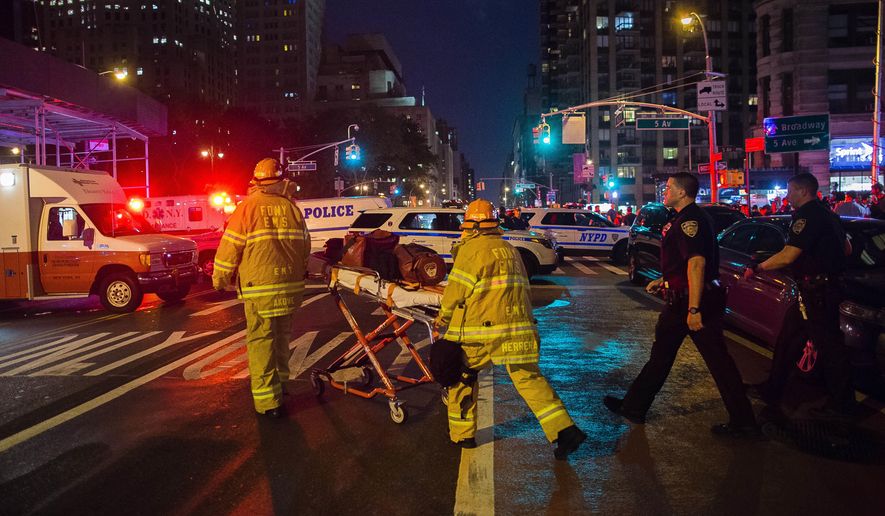The nation’s top counterterrorism official testified Tuesday that the world’s army of terrorists is “broader, wider and deeper than any point since 9/11,” the day al Qaeda attacked America.
Nicholas Rasmussen, who directs the National Counterterrorism Center, said the Islamic State may be losing ground in Iraq and Syria but its ability to strike abroad, including in the U.S., “has not thus far been significantly diminished.”
The nation is facing a phase in which people quickly radicalize and launch simple but deadly attacks before authorities have time to detect them, he said.
His testimony to the Senate Homeland Security Committee conflicts with upbeat reports from the White House, which has focused on territorial losses in Syria and Iraq as signs that the Islamic State is being defeated.
“Even ISIL’s leaders know they’re going to keep losing,” President Obama said in August. “In their message to followers, they’re increasingly acknowledging that they may lose Mosul and Raqqa, and ISIL is right … they will lose them. And we’ll keep hitting them and pushing them back and driving them out until they do.”
The Islamic State group, also known as ISIL, ISIS and Daesh, has set up its so-called capital in Raqqa, Syria, and controls Mosul, the second-largest city in Iraq.
Mr. Rasmussen made his sober assessment as the Department of Homeland Security issued a confidential warning. U.S.-based terrorists are likely focused on mass killings at festivals, concerts, sporting events and other outdoor events, says a confidential report obtained by The Washington Times.
The Sept. 23 warning was issued in the wake of a string of bombings in Manhattan and New Jersey for which an Afghan-born Muslim, Ahmad Khan Rahami, was apprehended in a gunfight with police.
The report says the “most likely tactics” would involve “edged weapons, small arms, vehicle assaults and possibly [improvised explosive devices],” said the report, a copy of which was obtained by The Times.
The Islamic State has urged Muslims on social media to use vehicles to achieve mass killings, as was carried out in July in Nice, France, by a follower of the group.
The Homeland Security Department’s office of intelligence and analysis “assesses that commercial facilities — such as festivals, concerts, outdoor events, and other mass gatherings — remain a potential target for terrorists or [homegrown violent extremists], as they often pursue simple, achievable attacks with an emphasis on economic impact and mass casualties,” the report said.
Homeland Security said homegrown loners make foiling plots difficult.
“We face an increased challenge in detecting in-progress plots by individuals or small groups acting quickly and independently or with only tenuous ties to foreign handlers,” the report says. “Preoperational indicators are likely to be difficult to detect; therefore, state, local, tribal, territorial, and private sector partners play a critical role in identifying and reporting suspicious activities and raising the awareness of federal counterterrorism officials.”
At the Senate hearing, Mr. Rasmussen and other witnesses described a growing trend in the killing business: U.S. residents can quickly become radicalized via social media and execute attacks, leaving little time for the FBI to detect them.
“While we’ve seen a decrease in the frequency of large-scale, complex plotting efforts that sometimes span months or years,” Mr. Rasmussen said, “we’re instead seeing much more rapidly evolving threats, or plot vectors, that emerge quickly or suddenly. And this so-called flash-to-bang ratio, the time between when an individual decides to attack and when an attack actually occurs, the flash-to-bang ratio of this kind of plotting is extremely compressed and allows very little time for law enforcement and intelligence officials to get their arms around a plot.”
He said Mr. Rahami and a Somali national accused of attacking shoppers with a knife in a mall in Minnesota are “individuals who choose relatively simple attack methods, propagated by terrorist organizations.”
On the Islamic State, he said: “It’s our judgment that ISIL’s capacity and ability today to carry out attacks in Syria and Iraq and abroad has not thus far been significantly diminished. And the tempo of ISIL-linked terrorist attacks and terrorist activity in Europe and other places around the globe is a reminder of that global reach.”
FBI Director James B. Comey said the U.S. should brace for the day when Islamic State fighters are rousted from Iraq and Syria.
“The challenge will be through the fingers of that crush are going to come hundreds of very, very dangerous people,” Mr. Comey testified. “They will not all die on the battlefield, in Syria and Iraq. There will be a terrorist diaspora sometime in the next two to five years like we’ve never seen before.”
He added: “We must prepare ourselves and our allies, especially in Western Europe, to confront that threat. Because when ISIL is reduced to an insurgency and those killers flow out, they will try to come to Western Europe and try to come here to kill innocent people.”
Homeland Security Director Jeh Johnson said a new type of terrorist is called “terrorist-enabled.”
They fall someplace between a self-radicalized loner and one directly controlled by an organization, Mr. Johnson said.
• Rowan Scarborough can be reached at rscarborough@washingtontimes.com.




Please read our comment policy before commenting.